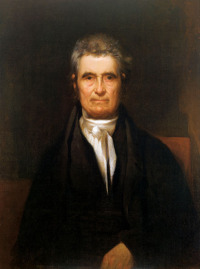Related Topics
Quakers: The Society of Friends
According to an old Quaker joke, the Holy Trinity consists of the fatherhood of God, the brotherhood of man, and the neighborhood of Philadelphia.
Quaker Values and Service
New topic 2016-12-03 20:19:53 description
Quakers and Indians

|
| John Cabot |
The concept of paganism was even extended to Protestant sects. Henry VII of England was given ownership rights to the rest of the undiscovered Western Hemisphere when John Cabot explored the coast of North America. Although matters were clouded somewhat when Henry VIII separated England from the Catholic Church, the principle of conferring undiscovered land to the first discoverer was continued under Protestant rule, and continued to include the proviso that there must be no Christian settlement if the land was to be claimed by a discoverer. This was a central element of the dispute between Lord Baltimore and William Penn over the ownership of what is now the State of Delaware. Penn acquired title to this area from the Duke of York, who had taken it from the Dutch. The argument went on for years as to whether wandering Dutch fur traders counted as Christian settlers, and therefore whether the Duke of York's title took precedence over the earlier grant of land south of the 40th parallel, given to the first Lord Baltimore by the first King Charles. What all these silly wrangles seem to prove is that ownership of land has always been a difficult and vague concept, filled with unfairness and judicial experience. The change from feudal, nomadic culture to a fixed agricultural one required that rules of ownership must be devised and held to, even though the logic and justice of them was rather easily challenged. One of the main functions of the modern state is to minimize and permanently settle boundary disputes, often with no sensible basis to work with.

|
| Chief Justice John Marshall |
In the United States, the creation of an entirely new nation by the forcible defeat of the previous British owners became a settled matter at the Treaty of Paris in 1783. The United States owned the land within its boundaries and was within its rights to redefine or reassign property as it pleased. The fine details of relations with the native tribes were settled in 1823 by the decision of Chief Justice John Marshall in Johnson v. M'Intosh. Marshall made the clear pronouncement that the tribes lost their sovereignty at the moment of discovery. However, his meaning is less clear when he went on to say the tribes had a right of occupancy, but not a right of ownership. The passage of two hundred years under this legal concept has created a legal situation of stare decisis and a practical problem that judicial questioning of the authenticity of millions of land titles after this long interval would bring the nation close to armed rebellion.
There is also a problem pointed out by the historian Edmond Morris, that after all these years we may not entirely understand the problem we are dealing with. Although there are individual exceptions, particularly in the Quaker states and Oklahoma, there are no documented instances of any Indian tribe being assimilated. There are literally hundreds of Indian languages, reflecting tribal differences as wide as between the Aztecs and the Esquimos. And attempts to assimilate have been as varied as the Spanish attempting slavery, the French favoring intermarriage, the English trying boarding schools for Indian children. But in five hundred years of colonization, the amount of assimilation has been trivial. Even the discovery of oil and the establishment of gambling casinos have created pockets of real wealth among the native Americans without any great sign of a willingness to assimilate. Looking backward, it would appear that five hundred years of experience were based on the assumption that the Indians would surely see the superiority of our culture, and wish to adopt it. For reasons no one understands, that premise does not seem to be correct and is certainly an arrogant one. But North America is now largely settled from ocean to ocean; to go back to dual existence, dual cultures in the school system, dual legal systems intermingled -- and dual sovereignty -- does not have the sound of a practical, peaceful solution to what is clearly a mixture of injustice and blundering.
Originally published: Sunday, February 21, 2010; most-recently modified: Monday, June 03, 2019